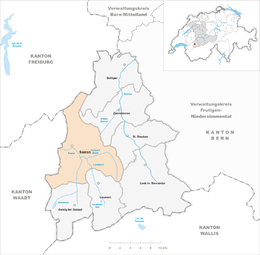Saanen
| Saanen | ||
|---|---|---|

Saanen village in winter
|
||
|
||
| Coordinates: 46°29′N 7°16′E / 46.483°N 7.267°ECoordinates: 46°29′N 7°16′E / 46.483°N 7.267°E | ||
| Country | Switzerland | |
| Canton | Bern | |
| District | Obersimmental-Saanen | |
| Area | ||
| • Total | 119.74 km2 (46.23 sq mi) | |
| Elevation | 1,014 m (3,327 ft) | |
| Highest elevation (Giferhorn) | 2,542 m (8,340 ft) | |
| Lowest elevation (Saane at Rüttischlucht) | 985 m (3,232 ft) | |
| Population (Dec 2015) | ||
| • Total | 6,871 | |
| • Density | 57/km2 (150/sq mi) | |
| Postal code | 3792 Saanen 3780 Gstaad 3777 Saanenmöser 3778 Schönried |
|
| SFOS number | 0843 | |
| Localities | Gstaad, Abländschen, Bissen, Ebnit, Gruben, Grund, Kalberhöni, Saanen, Saanenmöser, Schönried, and Turbach | |
| Surrounded by | Boltigen, Charmey (Gruyère) (FR), Château-d'Œx (VD), Gsteig bei Gstaad, Jaun (FR), Lauenen, Lenk im Simmental, Rougemont (VD), St. Stephan, Zweisimmen | |
| Twin towns | Darmstadt (Germany), Cannes (France), Ordino/La Massana (Andorra) | |
| Website |
www SFSO statistics |
|
Saanen (French: Gessenay) is a municipality in the canton of Berne in Switzerland. It is the capital of the Obersimmental-Saanen administrative district.
Saanen is first mentioned in 1228 as Gissinay. In 1340 it was mentioned as Sanon.
During the Bronze Age there was a hill fort on the Cholis Grind near the modern village of Saanen. The region was occupied by the Gallo-Romans until the 10th or 11th century when the Alamanni began to drive them out. This migration created the modern language borders in Switzerland. During the Middle Ages several forts were built to guard the mule trails into the Valais and Vaud. These included the Kramburg (which was first mentioned in 1331 but is now covered by later construction), the Swabia Ried tower (11th-12th century) and the tower Schönried (remains are visible as part of house number 349). During the Middle Ages it was part of the vogtei of Vanel in the county of Gruyère. In 1244, the counts became the vassals of Savoy. The counts' financial problems forced them to sell parts of the vogtei and some of the rights to the residents of Saanen in the 14th century. The village then became the center of the Saanen district and parish.
The villagers often acted against the interests of the counts. In 1340 the valley concluded a peace treaty with the Simmental, which provided for arbitration in disputes. They entered into another treaty in 1393 with the Valais. In 1401, Count Rudolph of Gruyère entered into a treaty with Bern which included Saanen. Two years later Saanen negotiated their own alliance with Bern. Due to the Bernese alliance, Saanen sent troops, under their own banner, to support the Bernese invasions of Aargau in 1415 and Valais in 1418. The military losses and taxes following the Old Zürich War led Saanen to support the Evil League (Böser Bund) in 1445 against Bern. It took about six years before Confederation mediation was able to resolve the arguments between Saanen and Bern.
...
Wikipedia



